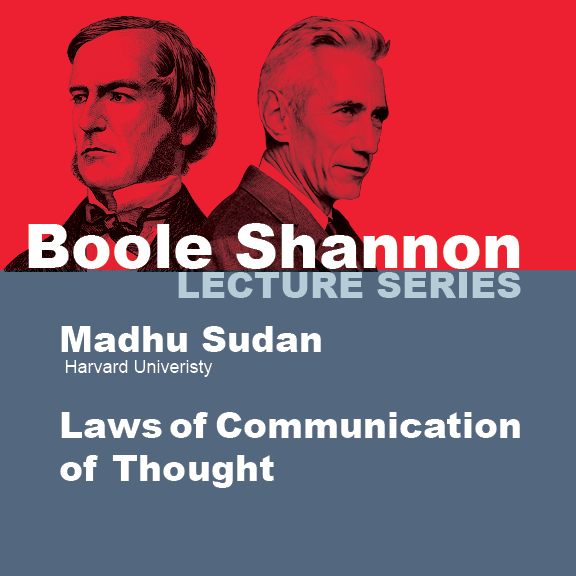Event
Lectures
Boole Shannon Lecture Series / Madhu Sudan
Boole Shannon LECTURE SERIES
Date:Thursday, 12/03/15
Time:4:00pm
Classroom: 54-100
Laws of Communication of Thought
Madhu Sudan
Harvard University
Abstract:
In their far-reaching works, Boole and Shannon took mathematics to places where it had never been before:
Inside the mind, formulating the “Laws of Thought”; and across our senses, via “A Mathematical Theory of Communication”.
Putting the two ingredients together and adding a healthy mix of the theory of computation gives us
the ability, in principle, to analyze any human/intelligent process. Indeed many of the resounding successes in the
theory of computing in the past thirty years or so may be described as an effect of this ability. In this talk I will briefly
cover some of the highlights of these explorations which capture concepts such as randomness, knowledge,
secrecy and privacy. I will then turn to the vehicle that I view as central to preserving Thought as it is Communicated:
Proofs! I will explain what proofs are, why they are central and how they (can be designed to) behave in
unexpected ways. Some of the talk will even be mathematically grounded.
Bio:
Madhu Sudan is a Gordon McKay Professor at the John A. Paulson School of Engineering and Applied Sciences
at Harvard University. Madhu Sudan got his Bachelors degree from IIT Delhi in 1987 and his Ph.D. from U.C.
Berkeley in 1992. Between 1992 and 2015, Madhu Sudan worked at IBM Research (Research Staff Member
1992-1997), at MIT (Associate Professor 1997-2000, Professor 2000-2011, Fujitsu Chair Professor 2003-2011,
CSAIL Associate Director 2007-2009, Adjunct Professor 2011-2015), and at Microsoft Research (Principal Researcher,
2009-2015).
Madhu Sudan’s research interests revolve around theoretical studies of communication and computation. Specifically
his research focusses on concepts of reliability and mechanisms that are, or can be, used by computers to
interact reliably with each other. His research draws on tools from computational complexity, which studies efficiency
of computation, and many areas of mathematics including algebra and probability theory. He is best known
for his works on probabilistic checking of proofs, and on the design of list-decoding algorithms for error-correcting codes.
